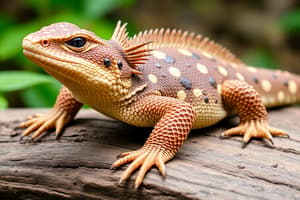Podcast
Questions and Answers
What group do tuatara belong to?
What group do tuatara belong to?
- Turtles
- Crocodilians
- Rhynchocephalians (correct)
- Lizards
How long ago did tuatara's ancestors branch off from lizards and snakes?
How long ago did tuatara's ancestors branch off from lizards and snakes?
- 400 million years ago
- 250 million years ago (correct)
- 100 million years ago
- 145 million years ago
How many species of rhynchocephalians are extant today?
How many species of rhynchocephalians are extant today?
- Twenty
- Five
- At least ten
- One (correct)
During which geological periods did rhynchocephalians live alongside dinosaurs?
During which geological periods did rhynchocephalians live alongside dinosaurs?
What factor contributed to the extinction of most rhynchocephalian species?
What factor contributed to the extinction of most rhynchocephalian species?
Which of the following statements about tuatara is true?
Which of the following statements about tuatara is true?
Fossils of extinct rhynchocephalians have been discovered in which of the following regions?
Fossils of extinct rhynchocephalians have been discovered in which of the following regions?
Which characteristic differentiates tuatara from lizards?
Which characteristic differentiates tuatara from lizards?
What does the Māori word 'tuatara' translate to in English?
What does the Māori word 'tuatara' translate to in English?
How often do female tuatara lay eggs?
How often do female tuatara lay eggs?
At what age do tuatara reach maturity?
At what age do tuatara reach maturity?
What is one of the main reasons for the decline of tuatara populations?
What is one of the main reasons for the decline of tuatara populations?
What behavior do hatchling tuatara exhibit that is different from adults?
What behavior do hatchling tuatara exhibit that is different from adults?
What is the average lifespan of a tuatara?
What is the average lifespan of a tuatara?
Where are tuatara found in the wild today?
Where are tuatara found in the wild today?
What is a unique physical feature of tuatara?
What is a unique physical feature of tuatara?
Flashcards are hidden until you start studying
Study Notes
What is a tuatara?
- Tuatara are reptiles that are not lizards.
- Tuatara are rhynchocephalians, a distinct ancient group of reptiles separate from lizards, snakes, crocodiles, alligators, turtles, and tortoises.
- Rhynchocephalians are believed to have diverged from lizards and snakes around 250 million years ago.
- Today, there is only one species of rhynchocephalian: the tuatara.
Take a trip to the Triassic!
- Rhynchocephalians were diverse during the Triassic, Jurassic, and Cretaceous periods, coexisting with dinosaurs.
- Forty species of rhynchocephalians existed in the past, inhabiting almost every continent.
- They varied in size, with some being small like skinks and others exceeding a meter in length.
- Their diet ranged from fish and insects to plants.
- Fossil evidence reveals their past distribution in Europe, North, Central, and South America, China, India, and Africa.
- New fossils are continually being discovered, indicating undiscovered species.
Last of its kind
- Rhynchocephalian populations declined towards the end of the Jurassic period, around 145 million years ago.
- By 66 million years ago, only a few species remained, all in the Southern Hemisphere.
- They disappeared from the fossil record globally, except for a single species.
- The sole surviving species is the tuatara, found only in New Zealand.
Back to the present
- Tuatara are only found in New Zealand, where they are known as "taonga" (treasure).
- They are named after the Māori word "tuatara," meaning "spiny back."
- Other Māori names include "ngārara" and "kārara."
What do tuatara eat?
- Adult tuatara are mostly nocturnal hunters.
- Their diet includes worms, beetles, weta, snails, spiders, slugs, lizards, birds' eggs, chicks, and sometimes baby tuatara.
Starting from an egg
- Female tuatara lay eggs every four years, typically digging underground nests.
- A clutch contains 6-12 eggs.
- Incubation lasts approximately a year.
- Hatchlings are about the size of a finger and emerge from the nest after 8-9 hours.
- Young tuatara are diurnal (active during the day), which helps them avoid predation by adults.
- They reach maturity at 10-15 years of age but continue growing until 30.
- Recent research suggests tuatara can live beyond 130 years.
Nearly wiped out again
- Prior to human arrival, tuatara populations thrived throughout New Zealand.
- Their only natural predators were native bats and large birds.
- Introduced predators, such as rats, cats, pigs, dogs, and stoats, devastated tuatara populations by consuming eggs, hatchlings, and competing for food.
- By 1895, tuatara were on the brink of extinction.
- Conservation efforts have allowed tuatara to flourish on predator-free offshore islands and mainland sanctuaries.
Fun facts about tuatara
- Their spines may appear sharp but are soft to the touch.
- They can grow up to half a meter in length and weigh up to 1.5 kilograms.
- Males are larger than females and have more prominent crests of spines.
Studying That Suits You
Use AI to generate personalized quizzes and flashcards to suit your learning preferences.



